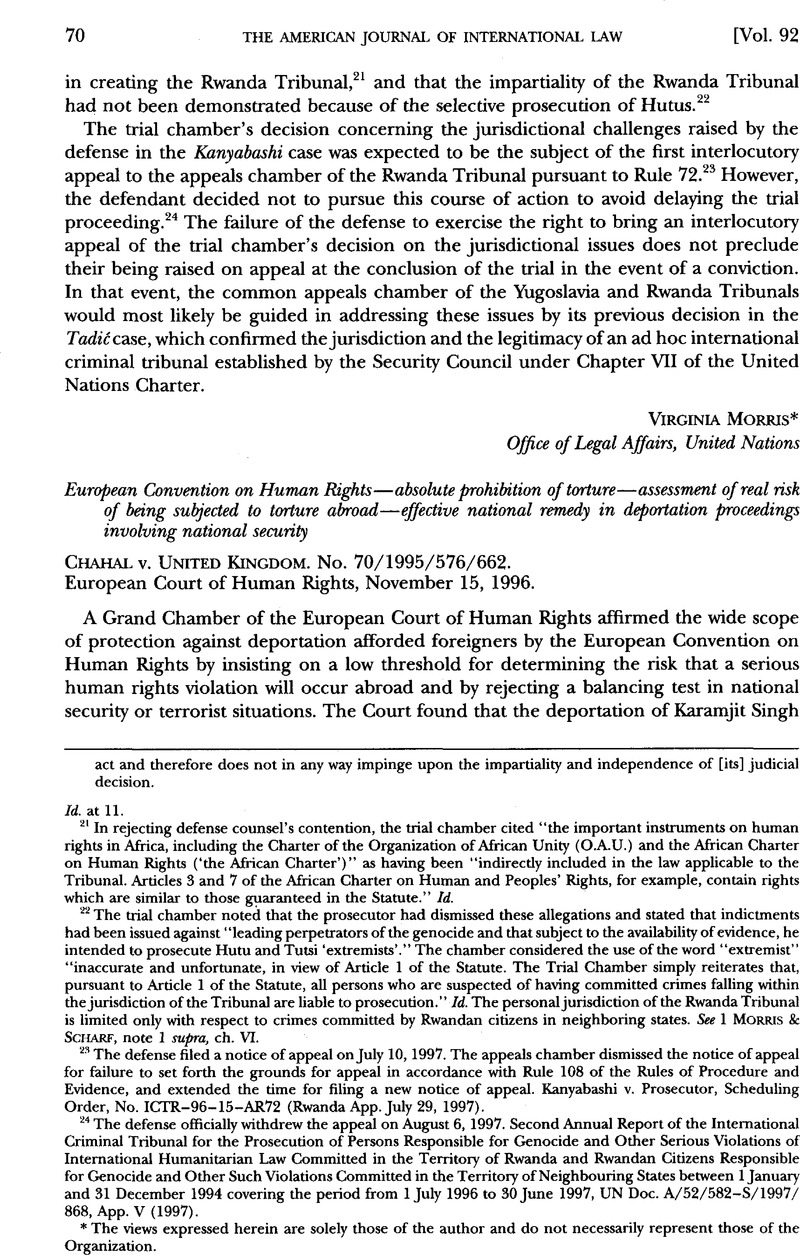Article contents
Chahal v. United Kingdom
Published online by Cambridge University Press: 27 February 2017
Abstract

- Type
- International Decisions
- Information
- Copyright
- Copyright © American Society of International Law 1998
References
1 Reprinted in No. 70/1995/576/662, para. 37 [hereinafter Judgment].
2 The European Court referred to the so-called Wednesbury Principles, as spelled out in Associated Provincial Picture Houses Ltd. v. Wednesbury Corp., [1948] 1 KB. 223.
3 Soering v. United Kingdom, 161 Eur. Ct. H.R. (ser. A) paras. 90–91 (1989). For details, see Richard, B. Lillich, The Soering Case , 85 AJIL 128 (1991)Google Scholar.
4 Soering, 161 Eur. Ct. H.R. (ser. A) para. 89.
5 July 28, 1951, 189 UNTS 150. Article 32 provides, in relevant part: “ 1 . The Contracting parties shall not expel a refugee lawfully in their territory save on grounds of national security or public order.”
Article 33 provides:
1. No Contracting State shall expel or return (“refouler”) a refugee in any manner whatsoever to the frontiers of territories where his life or freedom would be threatened on account of his race, religion, nationality, membership of a particular social group or political opinion.
2. The benefit of the present provision may not, however, be claimed by a refugee whom there are reasonable grounds for regarding as a danger to the security of the country in which he is, or who, having been convicted by a final judgment of a particularly serious crime, constitutes a danger to the community of that country.
6 Having found that the applicant’s deportation would violate Article 3, the Court considered it unnecessary to decide whether it would also violate the right of his wife and children (the other applicants) to respect for family life under Article 8 of the Convention.
7 See No. 70/1995/576/662, Joint partial dissenting opinion of Judges Gölküclü, Matscher, Freeland, Baka, Gotchev, Bonnici and Levits, para. 9.
8 Id., paras. 8–9.
9 R.S.C, ch. 1–2 (1976), as amended.
10 Vilvarajah v. United Kingdom, 215 Eur. Ct. H.R. (ser. A) paras. 122–26 (1991).
11 Sec No. 70/1995/576/662, Joint partly dissenting opinion of Judges Martens and Palm, para. 4.
12 See No. 70/1995/576/662, Partly dissenting, partly concurring opinion of Judge de Meyer, at II.A. Another dissenter believed the procedure must be organized in a way that ensures a speedy decision and detention outside prison facilities. See No. 70/1995/576/662, Partly dissenting opinion of Judge Pettiti.
13 Judgment, para. 79.
14 The dissenters were Judges Baka (Hungary), Bonnici (Malta), Freeland (United Kingdom), Gotchev (Bulgaria), Gölküclü (Turkey), Levits (Latvia), and Matscher (Austria).
15 See, e.g., the U.S. Supreme Court decision in United States v. Verdugo-Urquidez, 494 U.S. 259, 264–75 (1990) (search abroad); the Canadian Supreme Court decision in Kindler v. Canada (Minister of Justice), [1991] 2 S.C.R. 779 (extradition despite possibility of death penalty); and the German Federal Constitutional Court decision of January 10, 1995, BVerfGE 92, 26 (applicability of fundamental rights to German ships registered under a second flag) (“Zweitregisterentscheidung”). For a detailed discussion, see Juliane, Kokott, Ordre public und Grund-bzw. Menschenrechte , 35 Berichte der Deutschen Gesellschaft Für Völkerrecht (forthcoming 1998)Google Scholar.
16 For this requirement, see Ralf, Alleweldt, Protection against Expulsion under Article 3 of the European Convention on Human Rights , 4 Eur. J. Int’l L. 360, 373 (1993)Google Scholar.
- 1
- Cited by




